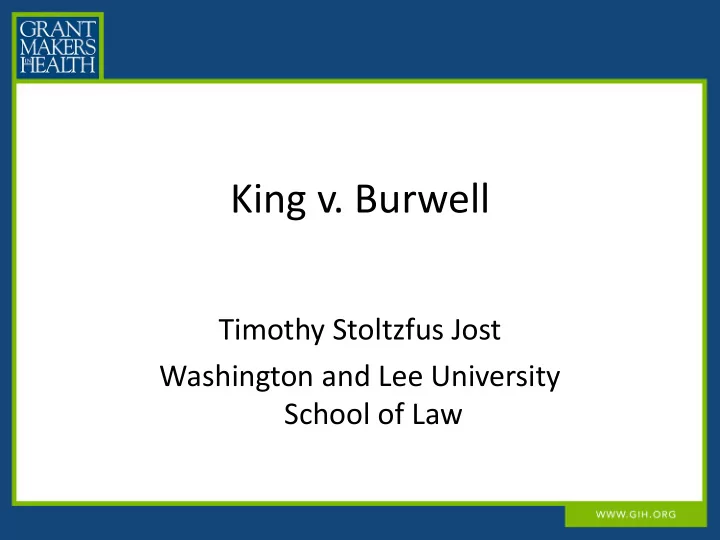

King v. Burwell Timothy Stoltzfus Jost Washington and Lee University School of Law
What is case about? • Brought by four plaintiffs who claim they are forced to buy health insurance or pay a penalty because tax credits are available in Virginia through a federally facilitated exchange. • Case is in fact brought by Competitive Enterprise Institute. • Plaintiffs claim that the IRS rule allowing federally facilitated exchanges to grant tax credits is invalid because tax credits can only be granted by an “Exchange established by the State.”
Lower court decisions • Both district court and Fourth Circuit upheld IRS rule. • Case decided on basis of Chevron doctrine: – If Congress has unambiguously expressed its intent, courts should give effect to that intent – If a statute is silent or ambiguous, courts should defer to agency’s interpretation.
District Court • Judge Spencer held that Congress had unambiguously authorized FFEs to grant tax credits. – Other sections of the ACA show that Congress meant for FFEs to grant tax credits. – “Exchange established by the State” language is used in other sections where Congress did not mean to refer only to state-operated exchanges. • But judge would also defer to IRS.
Fourth Circuit • Found statute ambiguous. • Deferred to IRS. • But Judge Davis, concurring, found statute unambiguous for IRS.
Supreme Court • Granted certiorari – No division among circuits, but case important and division possible. • Around 20 amicus briefs for plaintiffs, over 30 for government. – States on both sides, but 7 for plaintiffs, 23 for government. – Insurers and providers for government.
Oral Argument • Ginsburg, Breyer, Sotomayor, and Kagan for government, • Alito and Scalia (and probably Thomas) for plaintiffs, • Roberts quiet, • Kennedy concerned about constitutional issues.
Ruling • For plaintiffs if Court finds statute unambiguously supports plaintiffs, • For IRS if Court looks at whole statute and finds it unambiguously supports IRS rule, • For IRS if Court finds statute ambiguous, • Possibly for IRS if Court attempts to avoid constitutional issue, • Court could delay effect of ruling, but unlikely.
Recommend
More recommend